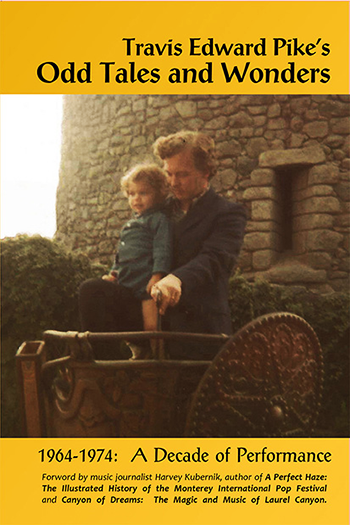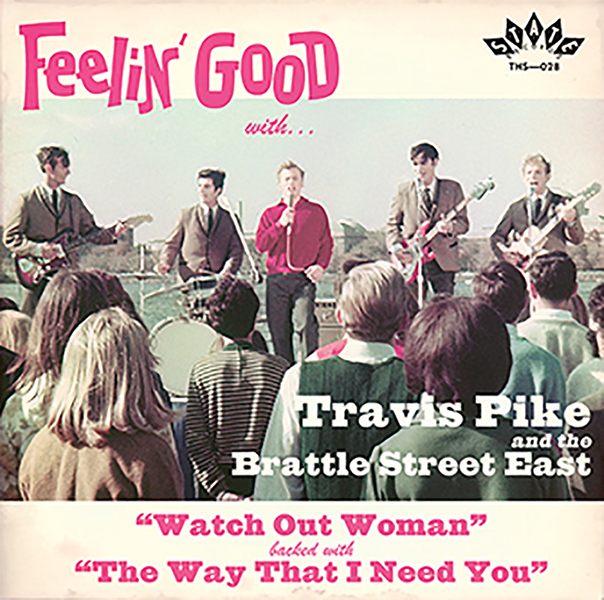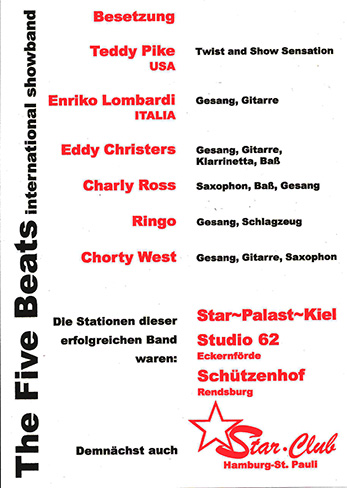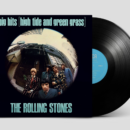I have worked with songwriter, singer, record producer, author and filmmaker Travis Pike for nearly 20 years.
Last decade he published 1964 – 1974: A Decade of Odd Tales and Wonders, a revised and much expanded memoir of the first ten years of his prodigious and prolific career in music. Having pulled together the Afterword to this new book, I can tell you it’s a deeper exploration of that era, with many more visuals and artifacts -- and I should know. I pulled together the Introduction to his 2013 Odd Tales and Wonders: A Decade of Performance.
Travis had a few singles written between 1964-1974 released independently, a dozen featured in movies, including three movie title songs, and many more never before recorded or released that were part of his original live performance repertoire.
Today, Travis, in complete control of his legacy and catalog, recording and releasing albums of audience favorites from 50 years ago, now has record labels contacting him to license and lease his master recordings!
Travis’ first movie title song was “Demo Derby,” arranged and produced by Arthur Korb at Ace Recording Studios in Boston, and recorded by The Rondels. That 28-minute action featurette opened in 1964 with Robin and the Seven Hoods and Viva Las Vegas, before being booked as the “second feature” that played on thousands of screens across the U.S.A. with The Beatles Hard Day’s Night.
So, while Travis was in Germany, his music was on the same screens with Frank Sinatra, Elvis Presley and The Beatles! That rare Pike Productions recording of the Rondels “Demo Derby,” is still sold online, and the Otherworld Cottage Industries DVD release of the Demo Derby 50th Anniversary Edition is still sold on wall.cdclick-europe.com/otherworldcottageindustries.
Harvey Kubernik Travis Pike Interview
Harvey: Now in your 80th year, with more than a half-century working in the entertainment industries, and more than a decade publishing books, including some of my music-related titles, you’ve moved to Nashville, Tennessee, and are restructuring your Otherworld Cottage Industries with an eye to securing a major music publishing entity to exploit your award-winning musical fantasy adventure Changeling’s Return. Frankly, I was always impressed by the fact that for some sixty years, you’ve held all the rights to your music. A true achievement. What prompts you to seek a music publisher now? Are you planning to retire?

Travis: I’m not retiring. I’m restructuring to dedicate myself to writing my Long-Grin Saga, its music and poetry, which may run to five volumes. Having a major music publisher handle my catalog will free me to do so and provide access to new and established talent and markets for my music. And realistically, at 79, if I am ever to experience “Changeling’s Return” on the big screen, I need a publisher with the connections and expertise to package that musical fantasy to production entities and talent to make it happen.
As you know, in November, 2019, I published an adaptation of my musical screenplay, Morningstone, retitled Changeling’s Return, a novel approach to the music, and a CD of its music titled Changeling’s Return, a novel musical concept, shortly before Covid struck. In January 2020, theMidwest Book Review called Changeling’s Return “a unique literary and musical experience, significantly augmented by an accompanying CD of the same title,” and unreservedly recommended it for community and academic library collections.
Louis Wiggett’s Four-Star review in the February 2020, 100th Issue of UK music magazine Shindig! reported ”Pike’s observant eye for narrative transforms the original story into a hotbed of 21st century action, sitting somewhere between David Essex’s ‘spoils of rock ‘n’ roll’ par excellence Stardust, and the rites, intrigue, and horror of The Wicker Man.”
Mike Stax, in his Spring issue of Ugly Things magazine, dubbed it [Pike’s] “newest gift to the world, a novel that draws on his experiences as a musician, and also stirs in elements of the supernatural. A compelling story with many surprising turns, and a powerful message about mankind’s impact on the environment and the urgency of changing course.”
Harvey: And before any of them, I wrote in my Foreword to Changeling’s Return, that you made it possible for readers and/or listeners, to escape into a supernatural world of magic, myth, and music unlike any hitherto known . . . where “songs are spells, going ‘round and ‘round in your head, even when there’s no music to hear.”
Travis: I particularly liked your “Changeling’s Return is Pike’s invitation to explore a world where mystery and destiny are forever intertwined. Having sipped from Changeling’s Return’s Cauldron of Inspiration, I emerged from its Stream of Consciousness with renewed hope. . .”
Harvey: The novel won an eLit Bronze Medal Award for Fine and Performing Arts, an E2 Media (UK) 2020 Award of Excellence, and Lee Zimmerman, in his November 30, 2020, Indie Spotlight review of Changeling’s Return in Goldmine magazine, reported “Pike continues to convey his magical tales through a symphonic surge and a cinematic sweep which fully convey the drama and drive to a dazzling degree. ”
You originally composed Changeling in 1975 when rock operas were all the rage, and in 1976, it was optioned by Cine-Media International. You adapted it into a movie musical screenplay that attracted producers, directors, movie stars, and was submitted and considered by some major studios, but never made it into production? What happened?

Travis: Difficult to say, but Cine-Media and most other independent productions raised money through limited partnership agreements, until Congress closed that “loophole,” making it nearly impossible to do so. As for the major studios, if a Director of Acquisitions quit -- or was fired, a previously greenlighted project might be unilaterally scrapped, enabling the new powers-that-be to develop and greenlight their own properties.
Harvey: You provided the theme music for your first theatrical movie release, The 2nd Gun, in 1974. How did you land that gig?
Travis: When my new friend, Hollywood Foreign Press correspondent Raoul Alteresco, introduced me to Gerard Alcan at a Christmas Party in the Hollywood hills, Gerard was producing a feature-length documentary about investigative reporter Ted Charach’s claim that the investigation of the murder of Robert Kennedy was botched, citing evidence that a second gunman fired the fatal shot.
Harvey: Your song, “End of Summer,” became the music theme for The 2nd Gun, subsequently nominated for a Golden Globe.
Travis: The film was nominated, not the music. Gerard described its music as the film’s Zeitgeist, and the way he wove it into the plot was extraordinarily effective, but I only licensed the music, without lyrics or vocals, to avoid linking that bitter-sweet ballad, composed for my German fans, to be forever associated with that tragedy, and today the song “End of Summer” stands on its own merit.
Harvey: When we first discussed doing this interview, I was stunned when you said if you found a major music publisher willing to pursue the motion picture deal, you would be prepared to include music publishing rights for your entire fascinating and commercial back catalog.
Travis: It makes sense. If any of my songs become hits by popular recording artists, or are instrumental in successfully launching new recording artists, interest in my catalog will be exponentially increased, including the music in Changeling’s Return.
Harvey: You’ve got songs with hit potential. The 1968 Travis Pike’s Tea Party Alma Records 45 “If I Didn’t Love You Girl” has since appeared on three compilation albums since it was first released. In 2004, The Backyard Patio, #7 of the Sixties Rebellion albums released in Germany, and in 2005, in a London Records compilation album Tougher Than Stains, and in 2016, released by UK deejay Rob Bailey in his le beat bespoke 7, compilationalbum and the following year, released on a 7” Mousetrap 30th anniversary 45.
Travis: More recently, 39-seconds of that original Travis Pike’s Tea Party recording of “If I Didn’t Love You Girl” are heard in the soundtrack of the 2020, 98-minute docudrama Delia Derbyshire – the Myth and Legendary Tapes about the woman who created the original 1993 theme to Doctor Who, produced by Andy Starke, and distributed by Anti-Worlds, that premiered on BBC-1 in May, 2021, written, directed and starring Caroline Catz (best known for her role in the Doc Martin BBC TV Series).
Harvey: Wow! I didn’t know that. But I was there when four-time Grammy Award winning sound engineer and producer Geoff Emerick, who worked with the Beatles on their albums Revolver (1966), Sgt Pepper’s Lonely Hearts Club Band (1967) and Abbey Road (1969), came out of retirement to record The Syrups debut album. Your youngest brother Adam was one of the Syrups and they covered your “If I Didn’t Love You Girl,” the sort of song Andrew Loog Oldham called “forever songs.”
Travis: Adam and I recorded it again for Otherworld Cottage’s Travis Edward Pike’s Tea Party Snack Platter album.
Harvey: Which begs the question, what moved you to team up with Adam to record your back catalog, a half-century after you quit performing live in 1969.? Were you planning a comeback?
Travis: No. Our mutual friend, David Carr and I co-produced the Ventures in Space long-form VHS video celebrating NASA’s 25th Anniversary for Award Records and Tapes, and in 1997, when I produced my epic narrative rhyme, Grumpuss, David arranged its music (and with Adam), recorded rehearsal tracks for the rhythmic gymnasts’ performances in my live benefit performance for the Save the Children Fund at Blenheim Palace, birthplace of Sir Winston Churchill, and home of the Dukes of Marlborough where I introduced my original epic narrative rhyme with a budget just shy of $1,000,000.
Harvey: In 1997, tied to the Save the Children Fund (and with the support of Buckingham Palace), you produced Grumpuss as a fund-raiser for that UK charity.
Travis: Yes, and in 1999, my Otherworld Entertainment Corporation VHS release of that epic narrative rhyme won an INTERCOM Silver Plaque Award for Special Achievement -- Writing at the Chicago Film Festival, and later received a coveted Jeanie Emerald Star Angel Award from the Southern California Motion Picture Council for my Contribution to Entertainment Industry and/or the Performing Arts -- and two decades after the VHS release of Grumpuss, when I released the original digibeta recording of that 1997 performance on DVD, it resulted in Otherworld Cottage Industries winning a LUXlife Global Entertainment Award for Best Audio Storyteller, 2018, and in 2020, an E2 Media (UK), Award, also singling out my Contribution to the Entertainment Industry and Performing Arts. Grumpuss has yet to be made into the CGI blockbuster I’d proposed in my original three-picture package, but my critically acclaimed performance did preserve its epic narrative rhyme.
David Carr, a classically trained pianist and arranger who collaborated with many musicians and songwriters, was an original a member of the British group, The Fortunes (“You’ve Got Your Troubles I’ve Got Mine”). He arranged my music and lined up the talent for my recordings of songs from Long-Grin, and asked me to write, direct and co-produce the Ventures in Space NASA 25th Anniversary long-form video for Award Records and Tapes, after which I asked him to arrange and conduct the Otherworld Festival Orchestra for Grumpuss.
Harvey: He was working with me at KUBRO talent management in those days and told me you were talking about recording your music catalog featuring songs going back to the mid-sixties.
Travis: We were. I had been buying all the gear to set up an in-house recording studio at Otherworld Cottage in Los Angeles, when on July 18, 2011, David suddenly died of a heart attack. The studio equipment I had purchased gathered dust for nearly 18 months, while I wrote my first illustrated memoir, 1964-1974; A Decade of Odd Tales and Wonders, after which, I donated the gear to my brother, Adam, to use in his recording studio, and toward the end of 2012, with everything installed, Adam and I began recording my catalog in his studio.
In 2013, I published my rock ‘n’ roll memoir and our first CD, Odd Tales and Wonders, Stories in Song, generating a rush of reviews, articles, and interviews in print and electronic media, including comprehensive UK interviews by Andy Pearson in his fearandloathingfanzine, Lenny Helsing in itspsychedelicbaby, and yours in musicconnection, forgottenhits60s.blogspot, cavehollywood, goldmine, uglythings, recordcollectornews and more now posted on the otherworldcottagindustries website.
Early the following year, I published your book, It Was Fifty Years Ago Today, THE BEATLES Invade America and Hollywood, and since then, you’ve interviewed me a number of times, but for all that, it was the Monday, November 7, 2016, Perlick Post that announced my return to the music scene, by reporting that “The Best music video of 2016 was actually shot in 1966,” calling attention to a movie clip of me and the Brattle Street East performing “Watch Out Woman” on Boston’s Charles River Esplanade in James A. Pike’s 1966 widescreen, color feature film Feelin’ Good I‘d posted on YouTube. The follow up article in the Monday, December 5, 2016, Perlick Post, cited the Winter 2016 issue of Ugly Things magazine, featuring The Turtles, Music Machine, Unnatural Axe, and Wrongh Black Bag, Tim wrote “Ugly Things contains the story behind the incredible ‘Watch Out Woman’ video by TRAVIS PIKE, which immediately caused jaws to drop throughout the garage rock world back in October when it mysteriously appeared on YouTube. Some notable Boston teen scene expert thought it might be a hoax – “How could I not know about a song/performance this great from back in the day?” –but pop culture historian Harvey Kubernik set the record straight by uncovering the strange-but-true story of Pike’s career. Evidently, Pike’s period as a songwriter and singer in New England during the mid-60s is just the beginning of a colorful showbiz adventure . . .” That, along with your article in Ugly Things, led to the phone call from State Records (UK), which licensed it and “Way That I Need You” from that sequence.
Harvey: I remember it well. Mike Stax gave me six full pages in Ugly Things, touching on your club performances when you were stationed in Germany and writing the title song to the Demo Derby featurette that opened with Viva Las Vegas, and the same night opened with Robin and the Seven Hoods, and went on to play thousands of screens across the US with the Beatles Hard Day’s Night.
Travis: Lenny Helsing’s stellar review in Shindig! magazine sent it into orbit when he wrote “It's not every day a song comes along that has the '60s garage appreciation congregation all in a lather, but Travis Pike's ‘Watch Out Woman,’ an unreleased gem of the hallowed vintage of 1966, is such an accolade-deserving specimen. It roars outta the speakers and moves rock 'n' roll obsessives - at least temporarily - into stop everything flip out mode since its discovery during the early part of last year via the internet, part of an unknown budget movie, Feelin' Good. Travis' clear and confident vocals rip through an unstoppable thundering rhythm, goaded on by clanging lead guitar and pounding drums, the whole producing a superb blast of highly charged, ultra-durable beat mayhem. Flipside, 'The Way That I Need You', decreases the pace, but this could've been like an unconscious template for 'Canyons of Your Mind', the Bonzos' still to be implemented timeless caper, but with serious attitude, heartfelt emotion and authentic fan-style screaming. You need this."
Harvey: Several of your tunes and master recordings have appeared in films and on TV, including five of your ten songs in the 1966 pop classic feature film, Feelin’ Good, now posted on YouTube. One of your Travis Pike’s Tea Party tunes, “If I Didn’t Love You, Girl,” has enjoyed an ongoing legacy since you wrote and recorded it nearly 60 years ago, and it was hailed in various UK and US music periodicals and outlets. Lee Zimmerman, in his February 3, 2018, review of Travis Edward Pike’s best work for Goldmine magazine, wrote “All the songs are radio worthy and hold up surprisingly well, even some 50 years past their prime. Timeless and tuneful, these re-recordings compare favorably with anything offered up by The Monkees, the Raiders, the McCoys, the Standells, and others of that ilk.” Tell us about the 21st century albums that now contain the bulk of your music catalog, and a bit about your favorites.
Travis: There are two special songs in my Odd Tales and Wonders Stories in Song CD and one of them, track #9, “Loup Garou” (about a werewolf prowling the bayou), is the most popular of all my recent recordings with YouTube visitors. I picked up some Cajun speech patterns from my neighbor in Los Angeles, who was originally from New Orleans, and worked them into the song. Another standout on that CD is track #7, “The Sorcerer’s Waltz,” composed for an early, proposed animated version of Long-Grin, no longer attached to that property, but a waltz arranged and sang as I imagined it would be sung by Ron Moody’s “Fagin” in the movie musical Oliver.
Harvey: In 1964 you were living in Germany singing Little Richard and Chuck Berry tunes on stage, billed as “Teddy Pike, Twist Sensation aus USA.”
Travis: I used to sing Little Richard’s “Lucille,” but that high-pitched screech owl howl was hard on my vocal cords, so frankly, I preferred singing Chuck Berry’s “Maybelline.”
Harvey: You have always been a storyteller. It’s the backdrop to your work and career, and you worked with well-respected screenwriter gatherings for several years in L.A. Is it all about telling a tale or describing a moment you want to tell and sing to us about?
Travis: It certainly informs the novelty songs in my Stories in Song CD.

Harvey: In addition to those novelty songs, you’ve written and recorded folk-rock, hard rock, psychedelic, long-form orchestral pieces, and even one full blown march. Tell us about the best songs from those other albums you recorded and published since 2013, and how you selected them.
Travis: I’ll start with how I choose them. I try, at least once a month, to list the number of plays each song in the six albums in my online repertoire are played on YouTube and select from the most popular with visitors. Unfortunately, my websites have a history of being disabled and are only recently back online and will hopefully remain so for as long as visitors come to listen.
“End of Summer” and “The Likes of You” are both popular on the Stories in Song album, but have unique histories addressed elsewhere in this interview, so I deliberately chose not to select either of them from the Stories in Song CD above.
Historically, the Feelin’ Better CD, has songs from the movie Feelin’ Good, but two of its most popular songs on YouTube, Track #10, “Rock ‘n’ Roll,” a song I wrote for The Five Beats, is performed as I would have done it in Germany in 1964, and Track #11 “End of Summer” is sung with German and English verses, and neither song was in the movie.
Reconstructed Coffeehouse Blues features songs I wrote and performed between bands, when I played solo or with Danny Gravas at King Arthur’s ( a coffee house with a liquor license), in Boston’s Combat Zone, and it’s especially hard to select favorites, because songs I’d arranged as solos, were recorded with Adam’s skillful improvisations. Track #4, “Mesmerizing Tantalizing Hazel-eyed Jane” and Track #5, “She’s Gonna Be a Woman Someday” (with a cameo performance by David Pinto on keyboards), were both chosen for being playful entertainment for one and all. But Track #1. “Sing a Song of Blues” is the most popular song on the CD, a new song about difficulties military personnel repatriation experience upon returning from a war zone, so if a “sixties” coffeehouse setting requires another protest song, Track #10, “Don’t You Care at All?” is a genuine Vietnam Era piece. On the other hand, if blues is the hook, I would pair Track #9, “Shaggy, Shaggy Blues” with “Sing a Song of Blues.”
The Travis Edward Pike Tea Party Snack Platter CD is next. I didn’t select Track #1, “If I Didn’t Love You Girl” because we discussed its inclusion on so many compilation albums, but the most popular song on that album according to YouTube visitors, is Track #7, “What’s the Matter with Your Mind?” It must hit a nerve with my fans because it’s the second most popular of all my songs on the Otherworld Cottage label. Track #10, “You Got What I Need,” and Track #11, “Oh Mama” were the most popular of the songs in Travis Pike’s Tea Party repertoire. https://www.youtube.com/watch?v=EljYOQ9IxXE&list=OLAK5uy_l0LIH5paK5uZ1EydJ-SDQJsWD25lmTBAw&index=10&pp=8AUB
Outside the Box has three songs in my YouTube Top Ten, including Track #1, “Andalusian Bride Suite,” an art song, I composed in 1974, to which I added a vocal dedicated to my daughter, Lisa, and French Horn and Trumpet parts played 40 years later by her two sons, then in middle school. Track #10 “Lovely Girl I Married” is another melody I composed in the sixties, but lyrically composed for my wife on our 50th anniversary. Track #11, “Star Maker,” is more current. I used to know how to get a record played, and if played far, wide, and often enough, it would result in a hit. But today, deejays have little control over programming, and most follow instructions issued by remote programmers, with whatever agenda they believe will attract the most listeners. And there’s one more on this album that I must mention, because nowadays, everything is politics. Track #8, “Gotta Be a Better Way,” has a rhythm that won’t quit and lyrics that don’t compromise.
Harvey: What about the songs on the Changeling’s Return CD?
Travis: The current Changeling’s Return CD features 18 tracks. Surprisingly, the most popular is Track #6, “In This Place.” It opens and closes acapella, evolving into a long-form processional, and then into a high-energy otherworldly dance. The second most popular is Track #4, “The Likes of You,” a love song (possibly conceived in “Otherworld”), after my car wreck in Germany in 1964. Track #3, “Morningstone,” the title song in the earlier property, also made the cut. Track #9 is “The Fool,” the result of a sip from the Cauldron of Inspiration, and Track #12, “Witchy Stew,” is an appropriate reaction by visitors experiencing Changeling’s Return for the first time. Track #14, “Mystical Encounter” cannot be denied and Track #16, “The Fool in Concert” is a medley pondering the delusion or efficacy induced of that sip from the Cauldron of Inspiration and recalls the invitation to explore Changeling’s Return inherent mysteries and destiny, and Track #18, “Dog, Roebuck and Lapwing” is intended to reawaken its spellbound audiences.














